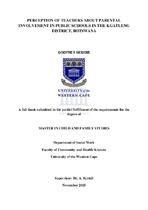Perception of teachers about parental involvement in public schools in the Kgatleng District, Botswana
Abstract
Student performance have decreased from 2008-2013 in the Kgatleng District, Botswana, despite efforts to encourage parents to actively be involved in their children‘s school. It is apparent that parents are not involved and leave the responsibility of child nurturing and development to the school with the teachers. Contributing factors to un-involved parents at school are communication; employment; single parenting, and poverty. This lead to the research question: What are the perceptions of teachers about factors that contribute to parental involvement/non-involvement in Public Schools? The aim of the study was to determine teachers‘ perceptions on factors that contribute to parental involvement/non- involvement in public schools. The objectives to arrive at the aim was to explore and describe teachers‘ perceptions on factors contributing to parental involvement in public schools; to explore and describe teachers‘ perceptions on factors contributing to parental non-involvement in public schools and to make recommendations for improving parental involvement in public schools to the Ministry of Education. Social constructivism was used as theoretical framework because teachers‘ perceptions are shaped by their contexts and language. The study used a qualitative research approach and an exploratory, descriptive design. The population was teachers who teach standard seven in all primary schools in the Kgatleng district. There are 35 primary schools in the Kgatleng district. The sample was a non-probability, purposive sample consisting of four (4) urban and four (4) rural schools in Kgatleng district of which from each school, two (2) participants were purposefully selected. Data was collected by in-depth interviews and analyzed by using a thematic approach. The research findings presented key factors that affect teachers and made recommendation
on how they can work with the parents and the community to successfully address the issue of non-parental involvement in schools. Tools for identifying specific needs and challenges for the uninvolved parents have to be developed and implemented. All relevant stakeholders should be included. A strong relationship with the social workers to address social challenges faced by the students, yielded positive results, hence recommending the need to have school based social workers. Recommendations include a partnership between the community, schools, teachers, parents and the Ministry of education to improve parental involvement in school

